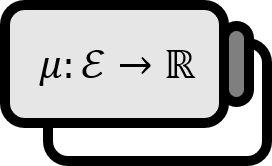Lebesgue Integral as a Generalization of Riemann Integral
Theorem 1
Let’s denote bounded functions as $f : [a,b] \to \mathbb{R}$ and $g : \mathbb{R} \to [0,\infty)$.
- [1]: $f$ being Riemann integrable over $[a,b]$ is equivalent to $f$ being almost everywhere continuous with respect to the Lebesgue measure on $[a,b]$.
- [2]: If $\displaystyle \int_{a}^{b} f(x) dx$ exists, then $\displaystyle \int_{a}^{b} f(x) dx = \int_{[a,b]} f dm$
- [3]: If $\displaystyle \int_{-\infty}^{\infty} g(x) dx$ exists, then $\displaystyle \int_{-\infty}^{\infty} g(x) dx = \int_{\mathbb{R}} g dm$
Explanation
All these discussions about measures can essentially be considered for the ‘generalization of integration’. Becoming able to calculate the definite integrals of more functions with the Lebesgue integral is beneficial, but it is meaningless if the value is different from Riemann integration.
It was challenging to determine whether Riemann integration was possible or not with basic analysis, but with theorem [1], proof becomes very straightforward. For example, the Dirichlet function $\mathbb{1}_{\mathbb{Q}}$, which is discontinuous at every point in $[0,1]$, does not possess a Riemann integral.
Capinski. (1999). Measure, Integral and Probability: p98, 101. ↩︎
